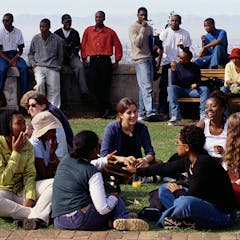
Articles on Informal economy
Displaying 1 - 20 of 42 articles

Identical informal businesses set up next to each other because they’ve created an informal welfare system.

Contemporary characterisations of squatters and street vendors as a “nuisance” reproduces colonial urbanism ideas of hygiene and order.

China has a lot of vacant retail space, including many underused shopping malls. An urban policy scholar describes how the Chinese are rethinking what the mall is for.

Through acts of covert resistance, women have been driving change in family relationships, women’s sexuality and reproductive issues, and women’s cultural identities.

A new book focuses on the politics of road transport, the everyday corruption and the hard-living world of transport workers in Lagos, Nigeria.

Collectors of recyclable materials are omnipresent in developing countries such as Brazil, and their work has long been a critical part of waste management, disposal, and recycling.

Asia’s much touted low-cost, export-oriented manufacturing model increases gender discrimination.

From butchers to hawkers, and shelters to miners, this book reveals the informal economy and texture of the city.

There is a need for better innovations and policies to help improve the fisheries sector in this region.

It is hard to fathom how Nigeria’s Central Bank interest rate increase would benefit most Nigerians.

The informal sector in Zimbabwe is massive. Finding ways to connect it to the formal sector is vital.

Street traders in South Africa play a significant role in the country’s economic and social development and deserve to be protected in terms of the Constitution.

Lockdown and stay-at-home orders may not benefit societies dominated by informal economies.

Influential international actors like the World Bank and the IMF should focus on expanding social protection rather than focusing on eliminating the informal economy.

While inequality is a global problem, its growth is most pronounced and the political, social and economic challenges it poses are most complex and pronounced in the global South.

Promoting entrepreneurship will help reduce unemployment in South Africa. But the government has to step up its game.

Thailand’s Buddhist temples, important centers of culture and commerce, rely on donations from international visitors. Because of a steep drop in tourism, these temples have been hit hard.

Since 1999, extreme poverty has declined while rates of young people in education and employment have risen. Without investment though, the impact of the pandemic could see this progress imperilled,

Urban governance must include community groups, non-state and informal actors in the battle against COVID-19 in Africa.

It is vital that the latest move by government towards restructuring succeeds in making the industry safe, reliable and viable, contributing to the country’s economy.
